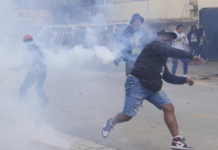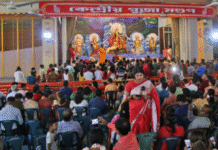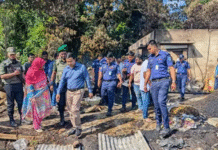Object of public wrath is Islamist politician found guilty of war crimes during Bangladesh’s war of independence in 1971

Festering resentment among a youthful population super-charged by social media is by now a familiar ingredient to mass protest movements around the world.
But the latest example of the phenomenon in the Shahbag area of the capital of Dhaka that has been dubbed Bangladesh’s “Tahrir Square” is not attempting to topple a military dictatorship.
A crowd estimated to be hundreds of thousands strong has been camped on the streets for 10 days demanding the execution of war criminals.
The movement has created such strong feelings that some expatriate Bangladeshis have flown home to support the call for the death penalty. Children have been filmed with the slogan “We want death by hanging” painted across their cheeks and torsos.
The object of the public wrath is Abdul Quader Mollah, an Islamist politician found guilty this month of crimes including massacres, torture and rapes during Bangladesh’s bloody war of independence from Pakistan in 1971.
Another eight members of Mollah’s Jamaat-e-Islami party are also on trial, as are two members of the opposition Bangladesh Nationalist Party, including a former government minister.
The men had attempted to resist efforts by what was then called “East Pakistan” to break away from the rest of Pakistan, triggering an immensely violent conflict. It is estimated that anywhere between 300,000 and 3 million people were killed by the Pakistani army and their allied local militias.
The prime minister, Sheikh Hasina, was elected on a platform of making the prosecution of war crimes a priority of her government.
Although Mollah’s conviction was a moment of immense symbolism in a country whose politics was forged by the brutal nine-month conflict, a large section of Bangladeshis were angered that he was only given a life sentence.
One observer, prominent media analyst Gazi Nasiruddin Ahmed, said the protests demonstrated the power of the young people who helped propel the ruling Awami League to a landslide victory in 2008.
“The youth believes the war criminals and collaborators of the occupation Pakistan army must be tried to give the families of the liberation war martyrs a sense of closure,” Ahmed said.
Many people have given credit to a group called the Blogger and Online Activist Network for first calling people to the streets. Websites continue to fuel the mood of national outrage, with laptop wielding bloggers camping on the road, uploading photos and live streaming speeches.
Public fury at the impunity many war criminals have enjoyed in the last 42 years grew further when Mollah, nicknamed the “Butcher of Mirpur” for his crimes, flashed a “V” for victory sign when he came out of the courtroom. Analysts in Dhaka say many people believed Mollah was so cocksure because he believes he could be pardoned under a possible change of government. Even some human rights activists who normally abhor the death penalty have supported it in this case. The trial was criticised by some legal experts for failing to follow due process.
Supporters of his Jamaat-e-Islami party have held counter-protests around the country.
On Thursday Shahbag, which protesters have renamed “New Generation Roundabout”, became a sea of candles, lit to mark those killed during the 1971 war. “I never thought I’d see something magnificent like this,” said Imran Ashraf Chowdhury, a man in his late forties. “The young ones have done us a great favour by awakening national consciousness in people.”
Police said that one man died of head injuries after being beaten by Jamaat-e-Islami supporters on Wednesday during fights between the police and the Islamists in the capital’s main business district. At least two supporters of Jamaat-e-Islami have died after clashes with police.
Source: The Guardian









